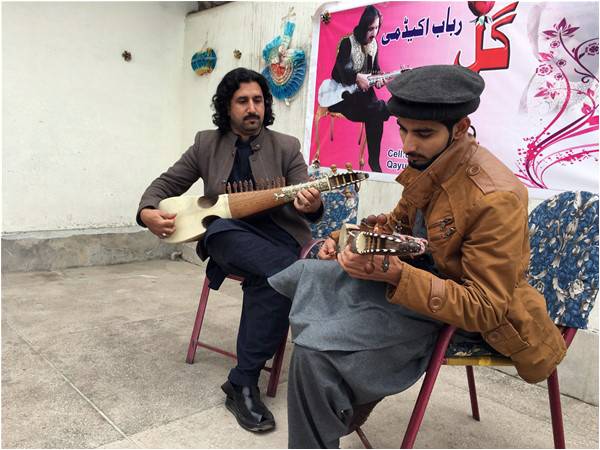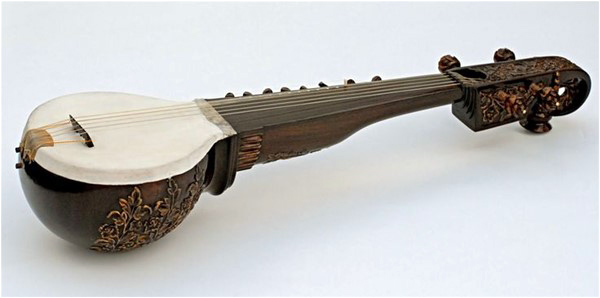
For the first time in the history of Khyber-Pakhtunkhwa, a renowned rubab player Gulab Khel Afridi (aka Gul) established a full-fledged rubab academy, named the ‘Gul Rubab Academy’, in Peshawar. In the province where in previous years music was close to banned and many musicians were threatening to quit the profession or leave the area in order to practice it,.
Sitting on a chair, Gul places the lute-like musical instrument on the upper part of his thighs, attired in traditional black-coloured shalwaar qameez with Peshawri chappal to match it, Gul says that he had once started the academy in 2010 but the situation was not favourable and soon after launching it, he was compelled to close the academy. Nevertheless, he says that the number of students back then was somewhat higher than now.
“My friends, colleagues and teachers advised me to close the academy and argued that this is not the appropriate time to teach rubab openly or to run any music academy” Gul explains.

Gul considers the last ten years to be the worst decade for Pashto music and culture. He observes, “Music is the best medium of communication but unfortunately since 2006 we were cut off from the rest of the world and we lost our identity.”
During the period from 2006 to 2016, the region was badly affected by terrorism, which severely damaged the music industry of the Khyber Pakhtunkhwa province and Federally Administered Tribal Areas (FATA). According to Faiz Ali Khan, a Swat-based lawyer and Pashto poet, almost all music centres and studios were close downed or blown up by the Taliban in Malakand, FATA and in many other parts of the province. When guns were ruling in the area the music was strictly banned, even tape-recorders and audio and video players from vehicles were being pulled out and destroyed on the spot, Faiz remembers.
The people were so terrified and threatened that they had not the courage to even store music in their smart phones.
“As a result many musicians left the area and quit the profession. Some of them started to recite only naat, hamd and other forms of religious-inspired poetry,” Faiz further adds.
Discussing the ups and down of Pashto music and the newly launched rubab academy Sher Alam Shinwari, a Peshawar-based culture journalist tells me that the Academy has a resplendent future and it is a good sign of recovering peace and stability in the area - although the aura is not the same is it was before 9\11. The Pashtun youth and lovers of the rubab from all over the world would benefit from the academy as it also provides facilities for online teaching through Skype and Whatsapp, he tells me.
Sher Alam insists that the government must take some serious steps to assist traditional music and musicians, as it is a critical aspect of our culture.
Rubab has a long history in Pashtun culture. Some experts say that the rubab is at least a thousand-year-old instrument. Other believe that it is some 500 years old. But a according to Abasin Yousafzai, Chairman of the Pashto Department in Islamia collage University, there is no certain, clear and authentic history of this musical instrument. In any case, many Pashto poets mentioned the rubab in their poetry, including the renowned poet Rahman Baba, who speaks of it in the following verses:
Thar da pocha guftago che za ye aoram
Pa naghama, pa tarana da Rubab khowakh yam
(I would prefer to play Rubab
than to hear the pointless discussion of people)
Rubab players and the Gul Academy have a different view about the history of the instrument. They say that currently there are seven types of rubab in the world, with different shapes - and each one has its own history.
Gul visited many countries for his performances including China, the UAE, Turkey and Egypt and earned many international awards including the UNESCO music award and Dubai Film Fare Best Musician Award.
The academy has attracted a large number of rubab enthusiasts, who have the desire to learn the intricacies of its use. Currently some twenty five students are enrolled in the first batch from various parts of Khyber-Pakhtunkhwa. Amongst these, ten are taking online classes: two are from the USA, two from Austria, one from the UK and one from Australia. The other four are from Karachi and Lahore.
A college student Kashif Altaf, who has recently joined the rubab academy, says that he was trying to play the instrument since he was twelve years old but it was very difficult to learn without a teacher. “During the last month, since I joined the academy, I can easily play the national anthem and a Pashto song!” Kashif tells me proudly. And then he starts playing the famous song:
Larsha Pekhawar ta kamees thor mala raora
Taza Taza golona dre saloor mala raora.
(Go to Peshawar and bring me a black shirt;
And two or three fresh flowers)
Gul is hopeful about the future of the Academy and will soon start teaching other instruments like the guitar and the harmonium. He hopes to join up with other renowned Pashto musicians to achieve all this.
Sitting on a chair, Gul places the lute-like musical instrument on the upper part of his thighs, attired in traditional black-coloured shalwaar qameez with Peshawri chappal to match it, Gul says that he had once started the academy in 2010 but the situation was not favourable and soon after launching it, he was compelled to close the academy. Nevertheless, he says that the number of students back then was somewhat higher than now.
“My friends, colleagues and teachers advised me to close the academy and argued that this is not the appropriate time to teach rubab openly or to run any music academy” Gul explains.

The people were so terrified and threatened that they dared not even store music in their smart phones
Gul considers the last ten years to be the worst decade for Pashto music and culture. He observes, “Music is the best medium of communication but unfortunately since 2006 we were cut off from the rest of the world and we lost our identity.”
During the period from 2006 to 2016, the region was badly affected by terrorism, which severely damaged the music industry of the Khyber Pakhtunkhwa province and Federally Administered Tribal Areas (FATA). According to Faiz Ali Khan, a Swat-based lawyer and Pashto poet, almost all music centres and studios were close downed or blown up by the Taliban in Malakand, FATA and in many other parts of the province. When guns were ruling in the area the music was strictly banned, even tape-recorders and audio and video players from vehicles were being pulled out and destroyed on the spot, Faiz remembers.
The people were so terrified and threatened that they had not the courage to even store music in their smart phones.
“As a result many musicians left the area and quit the profession. Some of them started to recite only naat, hamd and other forms of religious-inspired poetry,” Faiz further adds.
Discussing the ups and down of Pashto music and the newly launched rubab academy Sher Alam Shinwari, a Peshawar-based culture journalist tells me that the Academy has a resplendent future and it is a good sign of recovering peace and stability in the area - although the aura is not the same is it was before 9\11. The Pashtun youth and lovers of the rubab from all over the world would benefit from the academy as it also provides facilities for online teaching through Skype and Whatsapp, he tells me.
Sher Alam insists that the government must take some serious steps to assist traditional music and musicians, as it is a critical aspect of our culture.
Rubab has a long history in Pashtun culture. Some experts say that the rubab is at least a thousand-year-old instrument. Other believe that it is some 500 years old. But a according to Abasin Yousafzai, Chairman of the Pashto Department in Islamia collage University, there is no certain, clear and authentic history of this musical instrument. In any case, many Pashto poets mentioned the rubab in their poetry, including the renowned poet Rahman Baba, who speaks of it in the following verses:
Thar da pocha guftago che za ye aoram
Pa naghama, pa tarana da Rubab khowakh yam
(I would prefer to play Rubab
than to hear the pointless discussion of people)
Rubab players and the Gul Academy have a different view about the history of the instrument. They say that currently there are seven types of rubab in the world, with different shapes - and each one has its own history.
Gul visited many countries for his performances including China, the UAE, Turkey and Egypt and earned many international awards including the UNESCO music award and Dubai Film Fare Best Musician Award.
The academy has attracted a large number of rubab enthusiasts, who have the desire to learn the intricacies of its use. Currently some twenty five students are enrolled in the first batch from various parts of Khyber-Pakhtunkhwa. Amongst these, ten are taking online classes: two are from the USA, two from Austria, one from the UK and one from Australia. The other four are from Karachi and Lahore.
A college student Kashif Altaf, who has recently joined the rubab academy, says that he was trying to play the instrument since he was twelve years old but it was very difficult to learn without a teacher. “During the last month, since I joined the academy, I can easily play the national anthem and a Pashto song!” Kashif tells me proudly. And then he starts playing the famous song:
Larsha Pekhawar ta kamees thor mala raora
Taza Taza golona dre saloor mala raora.
(Go to Peshawar and bring me a black shirt;
And two or three fresh flowers)
Gul is hopeful about the future of the Academy and will soon start teaching other instruments like the guitar and the harmonium. He hopes to join up with other renowned Pashto musicians to achieve all this.

